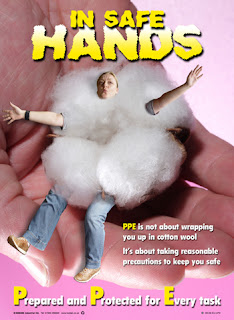 |
| 1 |
 |
| 2 |
 |
| 3 |
When I first took this job at Kodiak, back in 2005, I thought about how satisfying it would be to promote health and safety in the workplace. How great to be able to make a difference, to help prevent accidents and injuries – maybe even save a life or two.
What I didn't expect was how the public perception of health and safety had been – and still is being – influenced by the media. Instead of being commended by friends and family for doing something good, the news of my new job was received with tuts, eeks, oohs and elf 'n' safety stories recited from the Daily Mail.
"It's health and safety gone mad!"
"We're living in a nanny state!"
"You can't do that! It's elf 'n' safety!"
"It's health and safety gone mad!"
"We're living in a nanny state!"
"You can't do that! It's elf 'n' safety!"
Parades have been banned from the streets, conkers have been banned from the school playground and, today I read that, postmen and women have been stopped from crossing the road too many times.
So ridiculous are some of the stories, that the HSE has a Myth of the Month page on its website, just to dispel any misconceptions.
I wonder, when even the HSE doesn't endorse such overcautiousness, why people have been making such seemingly ridiculous and ill-informed judgments about safety?
One reason could be the huge amount of No Win, No Fee advertising that is currently in place on television, in magazines and here on the web. Today alone I have seen four such advertisements on websites I have visited.
"Have you had an accident that wasn't your fault?
You could be entitled to compensation."
You could be entitled to compensation."
While it is fair that a legitimately injured person should be compensated for an accident that wasn't their fault, this system is open to abuse. After all, who's to say that Tom's back pain is not as bad as he claims it is? Or that Harry doesn't need to take that much time off work to convalesce?
So, are councils, companies and other organisations over-cautious because they are afraid of claims being made against them? Or has elf 'n' safety become a standard excuse for those who wish to avoid taking responsibility? Maybe it's a bit of both.
Through Kodiak's motivational poster programme I hope to bring some common sense back to workplace safety and to challenge some of those negative perceptions.
For example, it's not just about telling your workers they have to do something, it's explaining why they have to do it. It's not about using health and safety as an excuse, it's about implementing it sensibly to reduce accidents and save lives. And that's what really matters.
To find out more about how Kodiak posters can help you promote health and safety in your workplace, please contact us to discuss your needs.

No comments:
Post a Comment